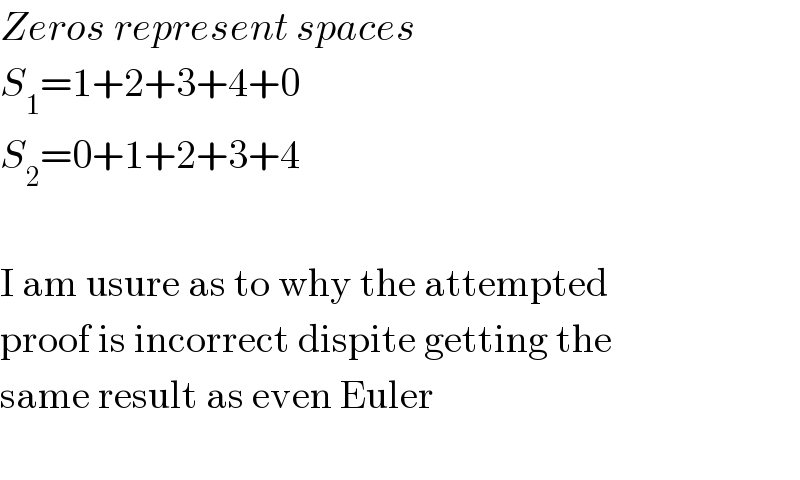Question Number 2138 by Filup last updated on 06/Nov/15

$$\mathrm{Is}\:\mathrm{the}\:\mathrm{following}\:\mathrm{proof}\:\mathrm{correct}? \\ $$$$ \\ $$$$\Delta=\underset{{i}=\mathrm{0}} {\overset{\infty} {\sum}}\left(−\mathrm{1}\right)^{{i}} \mathrm{2}^{{i}} =\mathrm{1}−\mathrm{2}+\mathrm{4}−\mathrm{8}+\mathrm{16}−\mathrm{32}+… \\ $$$$ \\ $$$$\mathrm{Let}: \\ $$$$\Delta_{\mathrm{1}} =\mathrm{1}−\mathrm{2}+\mathrm{4}−\mathrm{8}+\mathrm{16}−\mathrm{32}+… \\ $$$$\Delta_{\mathrm{2}} =\:\:\:\:\:\:\:\mathrm{1}−\mathrm{2}+\mathrm{4}−\mathrm{8}+\mathrm{16}−\mathrm{32}+… \\ $$$$ \\ $$$$\Delta_{\mathrm{1}} +\Delta_{\mathrm{2}} =\mathrm{1}+\left(−\mathrm{2}+\mathrm{1}\right)+\left(\mathrm{4}−\mathrm{2}\right)+\left(−\mathrm{8}+\mathrm{4}\right)+… \\ $$$$\therefore\Delta_{\mathrm{1}} +\Delta_{\mathrm{2}} =\mathrm{1}−\left(\mathrm{1}−\mathrm{2}+\mathrm{4}−\mathrm{8}+…\right) \\ $$$$\therefore\Delta_{\mathrm{1}} +\Delta_{\mathrm{2}} =\mathrm{1}−\Delta_{\mathrm{1}} \\ $$$$\Delta_{\mathrm{1}} =\Delta_{\mathrm{2}} =\Delta \\ $$$$\mathrm{3}\Delta=\mathrm{1} \\ $$$$\therefore\Delta=\frac{\mathrm{1}}{\mathrm{3}} \\ $$$$ \\ $$$$\therefore\Delta=\underset{{i}=\mathrm{0}} {\overset{\infty} {\sum}}\left(−\mathrm{1}\right)^{{i}} \mathrm{2}^{{i}} =\frac{\mathrm{1}}{\mathrm{3}} \\ $$$$ \\ $$
Commented by prakash jain last updated on 04/Nov/15

$$\mathrm{You}\:\mathrm{can}\:\mathrm{NOT}\:\mathrm{add}\:\mathrm{2}\:\mathrm{divergent}\:\mathrm{series}\:\mathrm{and}\:\mathrm{expect} \\ $$$$\mathrm{reesult}\:\mathrm{to}\:\mathrm{be}\:\mathrm{double}.\:\mathrm{Same}\:\mathrm{for}\:\mathrm{subtraction}. \\ $$
Commented by Filup last updated on 04/Nov/15

$$\mathrm{A}\:\mathrm{proof}\:\mathrm{of}\:\mathrm{1}+\mathrm{2}+\mathrm{3}+\mathrm{4}+\mathrm{5}+…=−\frac{\mathrm{1}}{\mathrm{12}} \\ $$$$\mathrm{involves}\:\mathrm{this}\:\mathrm{method},\:\mathrm{though}. \\ $$$$ \\ $$$$\mathrm{Also},\:\mathrm{according}\:\mathrm{to}\:\mathrm{wikipedia}'\mathrm{s}\:\mathrm{page}\:\mathrm{for} \\ $$$$\mathrm{this}\:\mathrm{sequence},\:\mathrm{this}\:\mathrm{answer}\:\mathrm{is}\:\mathrm{correct}. \\ $$
Commented by Filup last updated on 04/Nov/15

$${Zeros}\:{represent}\:{spaces} \\ $$$${S}_{\mathrm{1}} =\mathrm{1}+\mathrm{2}+\mathrm{3}+\mathrm{4}+\mathrm{0} \\ $$$${S}_{\mathrm{2}} =\mathrm{0}+\mathrm{1}+\mathrm{2}+\mathrm{3}+\mathrm{4} \\ $$$$ \\ $$$$\mathrm{I}\:\mathrm{am}\:\mathrm{usure}\:\mathrm{as}\:\mathrm{to}\:\mathrm{why}\:\mathrm{the}\:\mathrm{attempted} \\ $$$$\mathrm{proof}\:\mathrm{is}\:\mathrm{incorrect}\:\mathrm{dispite}\:\mathrm{getting}\:\mathrm{the} \\ $$$$\mathrm{same}\:\mathrm{result}\:\mathrm{as}\:\mathrm{even}\:\mathrm{Euler} \\ $$$$ \\ $$
Commented by prakash jain last updated on 04/Nov/15

$$\mathrm{Ok}.\:\mathrm{You}\:\mathrm{are}\:\mathrm{talking}\:\mathrm{about}\:\mathrm{a}\:\mathrm{different}\:\mathrm{sum}. \\ $$$$\mathrm{I}\:\mathrm{misunderstood}. \\ $$
Commented by 123456 last updated on 04/Nov/15

$$\mathrm{other}\:\mathrm{sumations}\:\mathrm{methods}\:\mathrm{and}\:\mathrm{analitic}\:\mathrm{clntinuation} \\ $$
Commented by Filup last updated on 04/Nov/15

$$\mathrm{Because}\:\mathrm{i}\:\mathrm{am}\:\mathrm{only}\:\mathrm{an}\:\mathrm{amature}\:\mathrm{mathematian}, \\ $$$$\mathrm{I}\:\mathrm{don}'\mathrm{t}\:\mathrm{really}\:\mathrm{understand}\:\mathrm{what}\:\mathrm{it}\:\mathrm{is}\: \\ $$$$\mathrm{I}\:\mathrm{have}\:\mathrm{done}.\:\mathrm{Please}\:\mathrm{explain}\:\mathrm{how}\:\mathrm{this}\:\mathrm{is} \\ $$$$\mathrm{a}\:\mathrm{different}\:\mathrm{type}\:\mathrm{of}\:\mathrm{sum}? \\ $$
Commented by prakash jain last updated on 04/Nov/15

$$\mathrm{My}\:\mathrm{mistake}.\:\mathrm{I}\:\mathrm{misread}\:\mathrm{your}\:\mathrm{question}.\:\mathrm{Also} \\ $$$$\mathrm{ignore}\:\mathrm{my}\:\mathrm{previous}\:\mathrm{comment}\:\mathrm{about}\: \\ $$$$\mathrm{divergent}\:\mathrm{series}. \\ $$
Commented by Filup last updated on 04/Nov/15

$$\mathrm{Ok}\:\mathrm{thank}\:\mathrm{you}\:\mathrm{very}\:\mathrm{much} \\ $$
